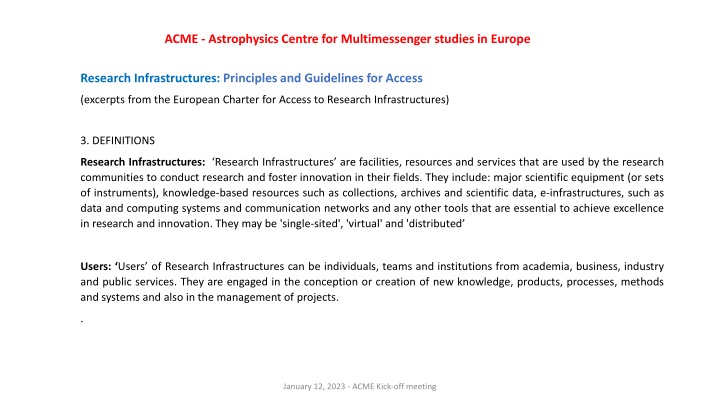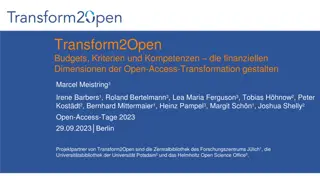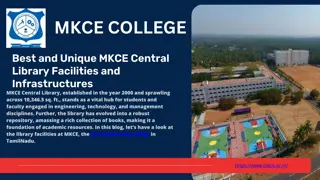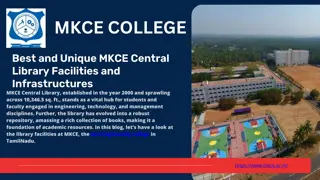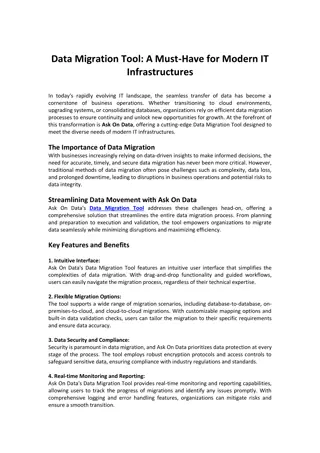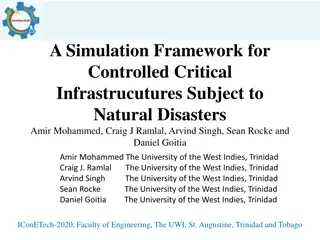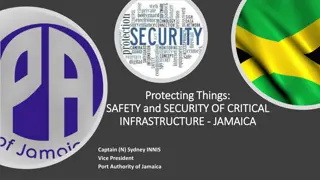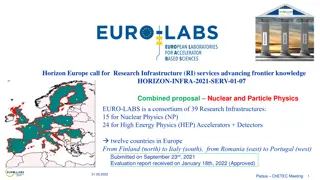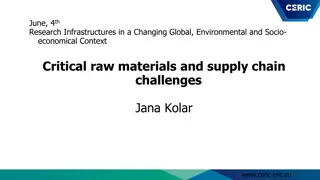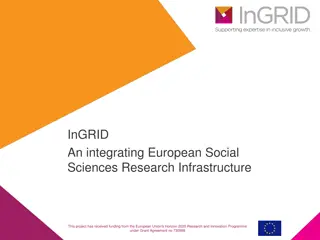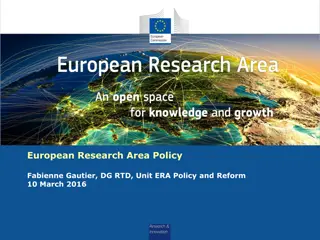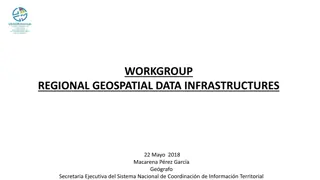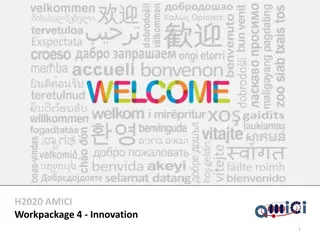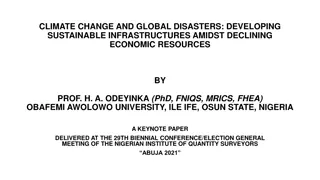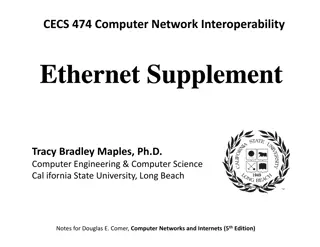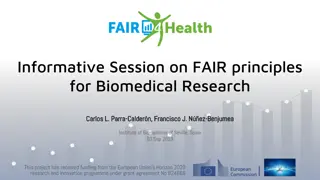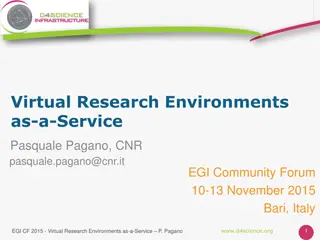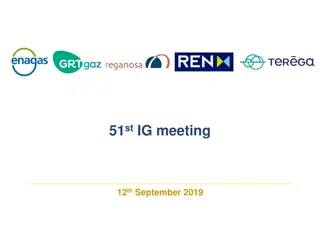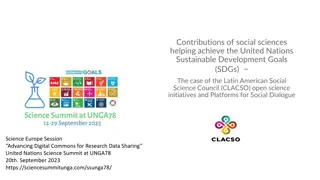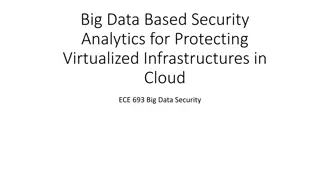Research Infrastructures: Principles and Guidelines for Access
Research Infrastructures are essential facilities, resources, and services utilized by research communities for conducting research and fostering innovation. The ACME Astrophysics Centre provides principles and guidelines for access to these infrastructures, emphasizing legitimate and authorized physical, remote, and virtual admission for users. It outlines definitions, principles, and specific features for access, highlighting the importance of research data management, trans-national access activities, and the selection process for researchers or research teams. The Centre aims to enhance service provision to the research community through coordinated access activities and transparent evaluation processes.
Download Presentation

Please find below an Image/Link to download the presentation.
The content on the website is provided AS IS for your information and personal use only. It may not be sold, licensed, or shared on other websites without obtaining consent from the author.If you encounter any issues during the download, it is possible that the publisher has removed the file from their server.
You are allowed to download the files provided on this website for personal or commercial use, subject to the condition that they are used lawfully. All files are the property of their respective owners.
The content on the website is provided AS IS for your information and personal use only. It may not be sold, licensed, or shared on other websites without obtaining consent from the author.
E N D
Presentation Transcript
ACME - Astrophysics Centre for Multimessenger studies in Europe Research Infrastructures: Principles and Guidelines for Access (excerpts from the European Charter for Access to Research Infrastructures) 3. DEFINITIONS Research Infrastructures: Research Infrastructures are facilities, resources and services that are used by the research communities to conduct research and foster innovation in their fields. They include: major scientific equipment (or sets of instruments), knowledge-based resources such as collections, archives and scientific data, e-infrastructures, such as data and computing systems and communication networks and any other tools that are essential to achieve excellence in research and innovation. They may be 'single-sited', 'virtual' and 'distributed Users: Users of Research Infrastructures can be individuals, teams and institutions from academia, business, industry and public services. They are engaged in the conception or creation of new knowledge, products, processes, methods and systems and also in the management of projects. . January 12, 2023 - ACME Kick-off meeting
ACME - Astrophysics Centre for Multimessenger studies in Europe Research Infrastructures: Principles and Guidelines for Access (excerpts from the European Charter for Access to Research Infrastructures) 3. DEFINITIONS Access: Access refers to the legitimate and authorised physical, remote and virtual admission to, interactions with and use of Research Infrastructures and to services offered by Research Infrastructures to Users. Such Access can be granted, amongst others, to machine time, computing resources, software, data, data-communication services, trust and authentication services, sample preparation, archives, collections, the set-up, execution and dismantling of experiments, education and training, expert support and analytical services. Access Unit: The Access Unit is a measure specifying the Access offered to the Users. Research Infrastructures are responsible for the definition of Access Units, which may vary from e.g. precise values like hours or sessions of beam time processing time, to gigabytes transmitted for the conduction of complex experiments and projects up to quotations based on an inventory of Users' needs. 4. PRINCIPLES Research data management: Research Infrastructures should have a research data management policy ensuring that research data are appropriately maintained, archived for a reasonable period, and available for review and (re-)use. Research Infrastructures and Users should have an agreement on how to (re-)use the data. If appropriate, they are also encouraged to consider providing open access to research data. January 12, 2023 - ACME Kick-off meeting
ACME - Astrophysics Centre for Multimessenger studies in Europe Specific features for Research Infrastructures (Work Programme 2023-2024) Trans-national access activities (TA) Trans-national access to infrastructure services offered under the grant is provided 'free of charge' to selected researchers or research teams (user-groups) including from industry. Access activities should be implemented in a coordinated way so as to improve the overall service provision to the research community. Access may be made available to external users, either in person ( hands-on ), when the user visits the infrastructure to make use of it, or through the provision to the user of remote scientific services (e.g. the remote access to a high- performance computing facilities) Research inrastructures must open specific calls to invite researchers to apply for access. A unit of access to each infrastructure service/installation needs to be identified and precisely defined in the proposal. The selection of researchers or research teams must be carried out through an independent peer- review evaluation of the research project. The research team, or its majority, must work in countries other than the country(ies) where the infrastructure is located except when access is provided by an International organisation, the Joint Research Centre (JRC), an ERIC or similar legal entities with international membership. The EU financial support to trans-national access will cover the access costs incurred by the access provider in providing access to the selected researchers, as well as the travel and subsistence costs incurred in supporting visits to the infrastructure of these researchers. January 12, 2023 - ACME Kick-off meeting
ACME - Astrophysics Centre for Multimessenger studies in Europe Specific features for Research Infrastructures (Work Programme 2023-2024) Virtual access activities (VA) Virtual access to research infrastructure is provided through communication networks to users complying with the RI s access policy, without selecting them. Examples of virtual access activities are provision of access to databases available via Internet, or data deposition services. The research infrastructures must publicise widely the access offered under the grant agreement to ensure that researchers who might wish to have access to the infrastructures are made aware of the possibilities open to them The EU financial support to virtual access will cover the access costs incurred by the infrastructure in providing access under the project, including the technological and scientific support researchers need to effectively use the services. A unit of access to each research infrastructure service must be identified and precisely defined in the proposal. The provision of virtual access during the project lifetime will be measured through the units of access defined in the grant agreement and must be periodically assessed by an external board. Eligibility criteria (e.g. affiliation to a research or academic institution) for users can be defined in the proposal, to take into account the access policies of the different RIs. January 12, 2023 - ACME Kick-off meeting
ACME - Astrophysics Centre for Multimessenger studies in Europe TA & VA eligible costs (DECISION authorising the use of unit costs for the costs of providing trans-national and virtual access in Research Infrastructures actions under the Horizon Europe ) 1. Form of Union contribution and categories of costs covered Recipients of Union funds shall declare for providing access to one installation the following eligible costs on the basis of either of the following: (a) unit costs calculated in accordance with their historical data for the categories of eligible costs mentioned below. (b) the reimbursement of eligible costs actually incurred for the categories of eligible costs mentioned below. (c) a combination of the forms of costs referred to in points (a) and (b), if part of the eligible access costs varies significantly and cannot be represented by its average. For each installation, one of the three forms referred to above shall be selected and shall be used consistently throughout the action. January 12, 2023 - ACME Kick-off meeting
ACME - Astrophysics Centre for Multimessenger studies in Europe TA & VA eligible costs (DECISION authorising the use of unit costs for the costs of providing trans-national and virtual access in Research Infrastructures actions under the Horizon Europe ) Direct costs for providing trans-national or virtual access to the installation: - Personnel cost of administrative, technical and scientific staff directly assigned to the functioning of the installation and to the support of the users. - Costs of contracts for maintenance and repair (including specific cleaning, calibrating and testing) specifically awarded for the functioning of the installation (if not capitalised). - Costs of consumables specifically used for the installation and the research work of the users. - Costs of contracts for installation management, including security fees, insurance costs, quality control and certification, upgrading to national and/or EU quality, safety or security standards (if not capitalised) specifically incurred for the functioning of the installation. - Costs of energy power and water where it can be verified as being supplied exclusively for the installation and as being a major cost item for the installation. - Costs of general services when they are specifically included in the provided access services (e.g. library costs, shipping costs). - Costs of software licence, internet connection or other electronic services for data management and computing when they are needed to provide access services. - Costs of specific scientific services included in the access provided or needed for the provision of access. Indirect costs for providing access to the installation equal to 25% of the direct costs referred to above, but excluding: - All contributions to the capital investments of the infrastructure (including rental, lease or depreciation costs of buildings as well as depreciation and lease of instrumentation). January 12, 2023 - ACME Kick-off meeting
